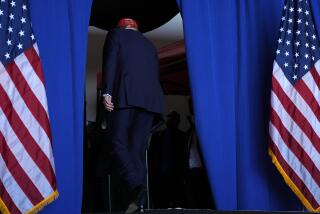Something Rotten in the Two Parties
- Share via
WASHINGTON — If U.S. politics were a volcano, we should be worrying--again--about the rumbling. The job approval of the Republican Congress dropped to just 19% in one major June poll. Current surveys show Republican Bob Dole still trailing President Bill Clinton nationally by 14-20 points--and by even more in California and New York. Dole leads Clinton in only one place--as a target of late-night TV jokes.
Yet more and more of Bill and Hillary Rodham Clinton’s time is being spent thinking about special prosecutors, angry FBI directors and old friends who might spill the Arkansas beans for reduced sentences. True, the U.S. Supreme Court isn’t letting the Paula Jones sexual harassment suit plague Clinton until after the election, but November is still several trials, hearings and, conceivably, federal indictments away. GOP phrasemakers, bored with “Travelgate” and “Filegate,” have begun trying out “Wifegate.” It’s hard to imagine that so much smoke doesn’t mean at least a few glowing embers.
All this explains the discouraging new challenge facing American voters: How best to arrange an underwhelming array of public officials and candidates to watch, investigate and even block each other? Chicago in the early ‘30s had the Untouchables; national politics now has the Untrustables--Dole and the GOP Congress in programmatic and ideological terms, the Clintons in personal integrity and ethics. Six or seven new political parties are maneuvering on the horizon--but they’re more a sign of public frustration than rescue.
The wild-eyed 104th Congress has become a major asset for Clinton, just like the last GOP Congress to face a Democratic president nearly 50 years ago. Speaker Newt Gingrich (R-Ga.), in turn, has become such an albatross that GOP House members, who once worshiped at his political shrine and voted with him 98% of the time, now say, “Newt who?” and ransack their records for disagreements. June’s CBS News poll found a stunning 54% to 33% majority saying if the GOP controlled the next Congress, it would be better to reelect Clinton to limit its power.
This attitude is particularly strong in the Northeast, Great Lakes and Pacific regions, because objectionable GOP policies are linked with suspect geography. For the first time in the history of the Republican Party, its Washington leadership has been subsumed by Southerners--Gingrich, Senate Majority Leader Trent Lott of Mississippi and Republican National Chairman Haley Barbour of Mississippi, along with a supporting cast of legislative leaders from Texas, South Carolina and Oklahoma.
Dixie’s more conservative politics explain much of the GOP’s unprecedented willingness to slash safety net programs, talk about shutting down the government and promote the religious right’s social agenda. In a bow to regional pride, Lott, the new Senate leader, just installed himself in the chair once used by former Mississippi Sen. Jefferson Davis--better known in his later job as president of the Confederacy.
So far, Clinton has been winning his gamble that the U.S. electorate will hold its nose over “dog-patch” ethics in order to block this Confederate Congress. But there is a point where that equation could soften--which explains why Gingrich has come out of partial hiding to attack Clinton on ethics. If this isn’t the president’s Achilles’ heel, he doesn’t have one.
A month or two ago, being attacked by Gingrich on ethics would have been like being called ugly by a frog. However, the ethical repute of the Clintons has taken a few more hits from Whitewater to Filegate. Then there’s the Perry County Bank trial that just began in Arkansas--where, once again, the president will have to testify by videotape.
Washington already has cynics--in both parties--who worry that if Clinton is reelected in November, he and his wife will be spending a large part of 1997 dealing with major legal embarrassments.
This may not stop the voters from reelecting Clinton--if only to block the Confederacy’s Revenge on Capitol Hill. But it could also have a corollary, as it did with Richard M. Nixon in 1972, the year of the Watergate burglary. Voters reelected Nixon by a huge majority, but they made sure he continued to face a Democratic Congress--to investigate him, keep him from destroying evidence and other such acts. In 1996, that could be a reason for reelecting the unpopular GOP Congress. If Clinton has them blocked, which the public clearly desires, this Congress could also keep an eye on him.
Americans have dealt with unhappy choices before. But it is hard to avoid the feeling that the predicaments of 1996--electing an untrustworthy president to block an unacceptably radical and untrustworthy Congress--are taking this nation onto a new plateau of cynicism.
One public response is to create more parties--since 60% of Americans favor a third party. Ross Perot’s Reform Party will meet in August to pick its nominee--probably Perot himself; though it looks like former Colorado Gov. Richard D. Lamm, a would-be Medicare slasher who once discussed old people’s “duty to die,” will try for the nomination. Ralph Nader will be the Green Party nominee in California and at least 20 or 30 other states. Investment expert Harry Browne is the most prominent contender for the Libertarian Party nomination, expected to be on all 50 ballots. Patrick J. Buchanan, in turn, is so angry over Dole’s turnabout on abortion that he has felt out a third-party race that would use the ballot positions of the U.S. Taxpayer’s Party--though few expect him to actually run.
That’s not even the end of the list. The Natural Law Party, favoring science as a guide to public policy, just filed 71,000 signatures to get a ballot position in Texas, and claims it will have 1,000 local candidates across the country this year. Moreover, a group of labor activists--big-name sponsors including four national unions from the Oil and Chemical Workers to the Longshoremen--recently met in Cleveland, Ohio, to launch a new Labor Party of the United States, although they won’t run candidates until 1998.
Then there’s the New Party, a left-liberal group that just scored a legal coup. The New Party’s lawsuit brought about the 8th Circuit Court of Appeals’ decision to strike down a Minnesota statute restricting fusion--allowing one party to cross-endorse nominees of other parties. The U.S. Supreme Court has agreed to take up the issue this fall, and experts say it could open up the two-party system.
But whatever happens, it won’t be in time for the 1996 election. Dole already understands that he’s trapped by the bombast and unpopularity of the GOP Congress. That’s why he resigned from the Senate; why he wants Colin L. Powell on his ticket, and why his advisors raised the idea of selecting retiring Sen. Sam Nunn, a conservative Democrat from Georgia, for vice president.
Dole is not the first major Republican to understand the need to rise above his party. Dwight D. Eisenhower in the mid-1950s, Nixon in 1972 and Ronald Reagan in the mid-1970s all weighed the idea of a new or fusion party. In the end, none of them made the move--and Dole probably won’t either. The GOP Congress may be a political albatross--but it’s also the Capitol Hill majority.
The one slim possibility for Dole to sidestep the party structure to electoral advantage also depends on the one imbroglio that could defeat Clinton--the ballooning of one or more Clinton scandals to the point where voters, thoroughly disgusted, favor some kind of independent or bipartisan national coalition government to rescue the country from gridlock, sleaze and corruption. For a time in 1973 and 1974, Watergate created some of that same pressure; and it’s conceivable that further Clinton scandal developments could create a similar opportunity for Dole this fall.
Otherwise, the choice in November could, all too easily, be between majority party presidential nominees and Congressional factions that have lost public confidence, on one hand, and, on the other, minor parties that lack the ability to govern. This would only make the volcano of national political frustration rumble even louder.*
More to Read
Get the L.A. Times Politics newsletter
Deeply reported insights into legislation, politics and policy from Sacramento, Washington and beyond. In your inbox three times per week.
You may occasionally receive promotional content from the Los Angeles Times.










